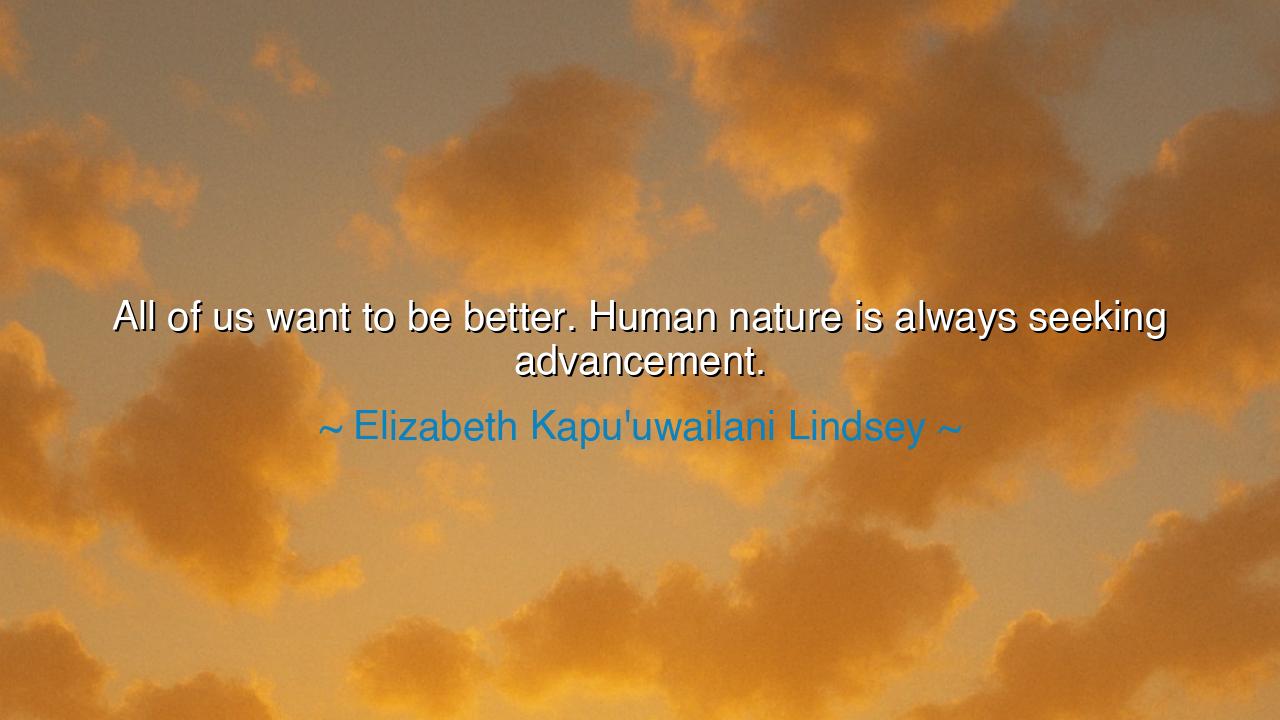
All of us want to be better. Human nature is always seeking






Hear the words of Elizabeth Kapuʻuwailani Lindsey, a daughter of Hawaiʻi and a seeker of wisdom: “All of us want to be better. Human nature is always seeking advancement.” This is no passing reflection, but a truth that resounds through the long corridors of history. Within every human heart burns a restlessness, a yearning to rise above what is, to reach toward what might be. From the first fire struck by stone to the soaring flight of iron birds in the sky, this impulse has never ceased—the unending desire to be better.
For what is human nature if not a tide forever pressing forward? Even the child, taking its first unsteady steps, is driven by an unseen force to stand, to walk, to run. The farmer, bent over his soil, longs for a greater harvest; the scholar, lost among scrolls, hungers for deeper knowledge; the warrior, scarred from battle, dreams of victory not yet won. It is not enough for us merely to survive—we are called by some secret voice to improve, to grow, to push the limits of our being. This is the law of our kind: advancement.
History offers many witnesses to this truth. Consider Abraham Lincoln, born in a log cabin, raised in poverty, with little schooling save the books he borrowed by candlelight. Yet within him burned the flame of wanting to be better—not only for himself, but for his nation. From humble beginnings he rose to guide his country through its most terrible trial, proving that the hunger to advance, when joined with integrity and perseverance, can lift even the lowliest soul to greatness. His life was a testament to Lindsey’s words: that human nature seeks advancement not only in wealth or power, but in justice, compassion, and unity.
Yet, this restless drive carries both blessing and danger. For the longing to be better can lead to nobility or ruin. When guided by wisdom, it builds civilizations, heals the sick, enlightens the ignorant, and raises humanity closer to its divine potential. But when corrupted by greed or arrogance, it destroys, enslaves, and consumes. The same impulse that forged the temples of Athens also forged the weapons that razed them. Thus, advancement must be wedded to virtue, lest our desire to be better turn into a curse upon ourselves and the earth.
Krishna taught in the Bhagavad Gita that man is always in motion, never at rest, for action is his very nature. So too does Lindsey remind us: we cannot remain as we are. To stand still is to wither, to stagnate. Just as water must flow to remain pure, so must the human spirit strive for growth. But we must ask: toward what shall we advance? Shall it be the accumulation of gold alone, or the cultivation of the soul? Shall it be conquest over others, or mastery of the self? These choices shape the destiny of individuals, and of nations.
What then is the lesson for us, children of tomorrow? It is this: honor the fire within you that seeks to be better, but guide it with clarity and love. Set before yourself not only the goal of advancement in skill, wealth, or reputation, but advancement in kindness, in wisdom, in courage. Seek not to outshine your neighbor, but to outshine your former self. Let your advancement be like the rising sun, which illuminates not only itself but the world around it.
Therefore, live as Lindsey counsels: embrace your human nature, which forever seeks advancement, but let that advancement be rooted in truth. Each day, ask yourself: How shall I be better today? How shall I grow not only in strength, but in character? In this way, you will honor the ancient drive of your nature, and yet transform it into something noble. For the fire of progress, when tempered with virtue, becomes the light of wisdom. And in that light, humanity shall continue its eternal ascent.






AAdministratorAdministrator
Welcome, honored guests. Please leave a comment, we will respond soon